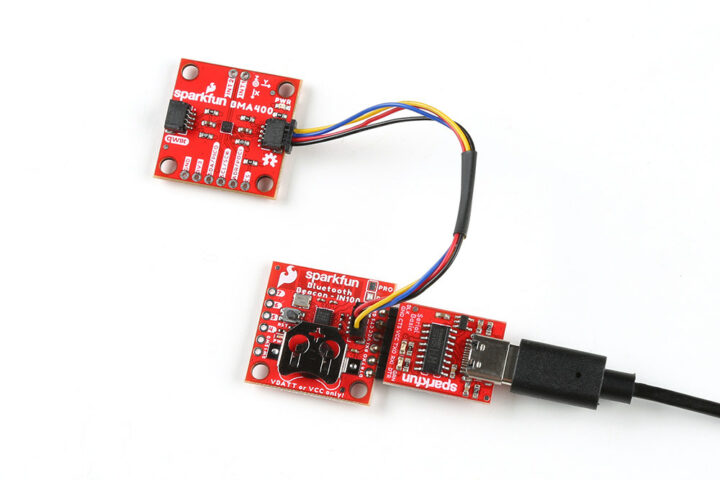Sparkfun NanoBeacon is a module equipped with InPlay IN100 NanoBeacon Bluetooth 5.3 beacon SoC, a Qwicc connector, and a few GPIOs designed to work with Bosch Sensortec BME280 3-in-1 humidity sensor, measuring humidity, air pressure, and ambient temperature, and the BMA400 ultra-low power accelerometer sensor.
The IN100 NanoBeacon SoC consumes less than 650nA in sleep mode, supports proprietary, Bluetooth, Google Eddystone, and Apple iBeacon beacon modules, and offers a long range of up to several hundred meters.
Sparkfun NanoBoard specifications:
- Bluetooth Beacon SoC – IN100 NanoBeacon SoC (See datasheet for details)
- Memory – 4 KB SRAM + 4 Kbit OTP memory
- Bluetooth 5.3 compliant
- Beacon Modes: Proprietary, BT, Google Eddystone, and Apple iBeacon compliant
- 2.4GHz RF frequency band, MedRadio band (2.36GHz)
- Programming-free and firmware-less design
- Long-range transmission: up to several hundred meters
- Security
- Authentication of beacon ID
- Privacy of advertising payload
- Power consumption
- Sub-uW power consumption for multi-year operation on a tiny battery
- Sleep current: 650nA (with RC on)
- Package – DFN8 2.5×2.5mm; QFN18 3x3mm
- Temperature Range – -40°C ~ 125°C
- I/Os
- 1x vertical Qwicc (I2C) connector
- 2x 6-pin through holes with 3.3V UART, 4x GPIO, 2x switch pins (Lite: no fitted with headers, the non-Lite board comes with headers)
- Misc (Lite only) – Reset Button, Power LED
- Power supply
- 1.1 to 3.6V DC input
- Coin-cell battery holder for a single 3V CR1225 battery
- Dimensions – 2.54 x 2.54 cm
The Lite version of this breakout is intended for prototyping and includes a reset button and power LED, while the standard version is designed for mass production and does not have the reset button or power LED populated, but some male headers are soldered to board’s through-hole pins.

As mentioned in the specifications, the NanoBeacon board is a programming-free board, and you’ll just configure it through InPlay’s Nanobeacon Config Tool GUI to configure and program the IN100 in Windows, Linux, or macOS. In a typical setup, the Sparkfun NanoBeacon board would be connected to a sensor board such as the Sparkfun BMA400 Qwiic module, and a serial board to connect the board to the host for configuration with the config tool. There’s also a NanoBeacon BLE Scanner App that can be installed from Google Play or the Apple App Store.
You’ll find instructions in a tutorial on the Sparkfun Learn website and a demo of the config tool in the video below.
The module targets the development and deployment of low-power IoT sensor nodes with minimal programming (no-code / low-code platform). SparkFun NanoBeacon Board – IN100 and SparkFun NanoBeacon Lite Board – IN100 can be purchased for $5.95 on the company’s store.
Thanks to TLS for the tip.

Jean-Luc started CNX Software in 2010 as a part-time endeavor, before quitting his job as a software engineering manager, and starting to write daily news, and reviews full time later in 2011.
Support CNX Software! Donate via cryptocurrencies, become a Patron on Patreon, or purchase goods on Amazon or Aliexpress




